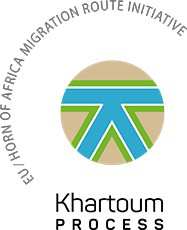On 21 September 2021, Switzerland and Ethiopia co-hosted a Virtual Roundtable titled Return, Reintegration and Integration: Finding Durable Solutions.
The thematic focus of this virtual roundtable is at the core of several guiding documents in the framework of the Khartoum Process. The Declaration of the Ministerial Conference of the Khartoum Process from 28 November 2014 lists addressing irregular migration, including through cooperation on return, in particular voluntary return, and readmission as one of the thematic priorities of the Khartoum Process. Similarly, the Joint Valletta Action Plan outlines strengthening cooperation in order to facilitate the return and sustainable reintegration of irregular migrants as a priority under Domain 5: Return, Readmission and Reintegration.
While members of the Khartoum Process have undertaken significant progress and efforts towards strengthening dialogue and cooperation under this thematic priority, the interrelated topics of return, reintegration, and integration were last explored in the framework of the Process in 2016, on the occasion of the Thematic Meeting on Return, Readmission and Reintegration, co-chaired by Ethiopia and Italy.
As a first step to resuming deliberations on this important topic, this virtual roundtable was organised, as a means of setting the grounds for in-depth deliberations, during an upcoming in-person Thematic Meeting, establishing a conceptual framework of durable solutions in all three fields for the discussion and identifying priority areas for further exploration.
Some of the questions addressed during the meeting included, among others:
- How can the durable solutions approach be applied in the return, reintegration, and integration of migrants and refugees?
- What is the institutional and legislative context for sustainable returnn?
- What type of structural barriers need to be addressed in countries of origin and destination to make return and reintegration effective?
- What types of partnership and coordination mechanisms are essential for durable return and reintegration solutions?
- How could development programmes and reintegration programmes be aligned to ensure long-term results?
- How do integration efforts relate to and interact with return and reintegration efforts?
These questions were addressed by experts from a broad range of organisations and institutions, including Samuel Hall, the European Commission, International Organisations such as IOM, as well as networks (European Regions Research and Innovation Network) and regional bodies (Intergovernmental Authority on Development).
The virtual event brought together over 70 attendees and panellists who, in addition to establishing a conceptual framework, also explored together further priority areas to be addressed during the upcoming in-person Thematic Meeting.
Despite the limitations posed by virtual events, an added value of this format was the fact that it allowed for a broader participation of technical experts from the Khartoum Process membership and outside of it, thus ensuring a more inclusive participation.
